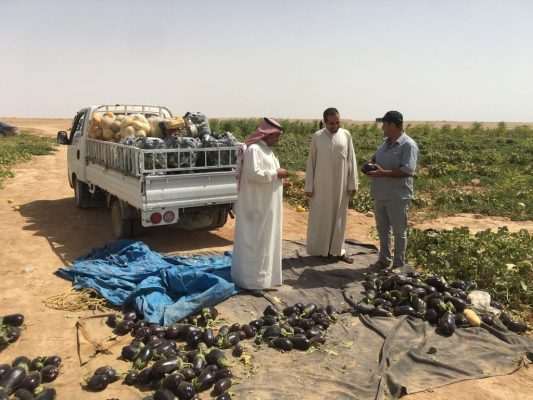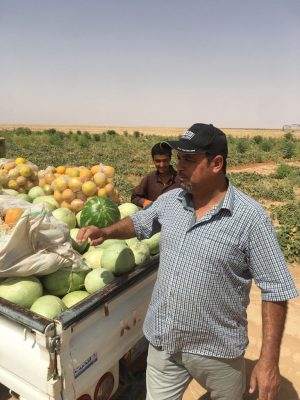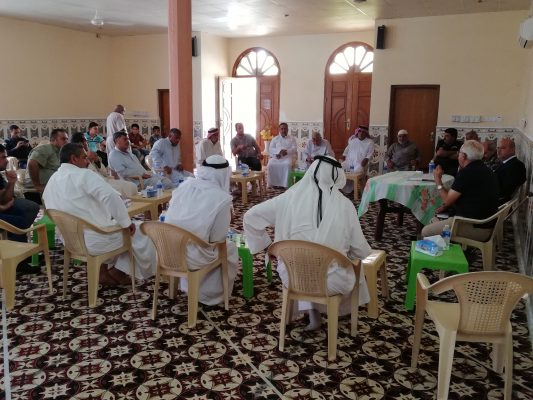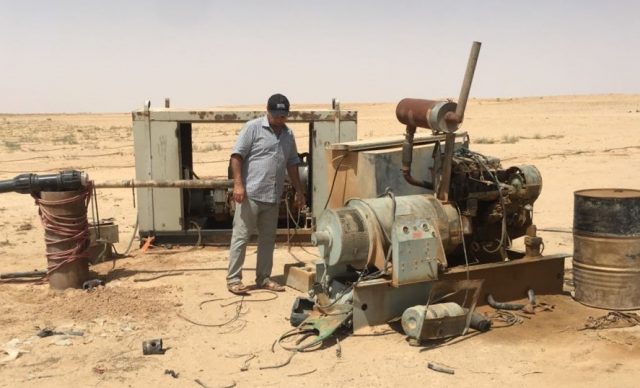
At a workshop hosted by the CIPE-supported Economic Recovery Taskforce – Anbar (ERT-A) in al-Ramadi on April 30, 2018, two brothers approached the taskforce to ask for guidance. Mustafa Kamel Sulaiman and his brother Wathiq are farmers from the village of al-Rahaliyah, which lies 100 kilometers (62 miles) southwest of Fallujah and produces high-quality dates, wheat, barley, and other strategic crops. The brothers, like many other farmers in Anbar province, needed support. The local chapter of the Federation of Agricultural Associations (FAA) had closed, leaving farmers unable to access the subsidized agricultural goods they need such as seeds, tools, and fertilizer. Furthermore, the area suffers from water scarcity, no electricity, and high fuel prices to run diesel generators.
Anbar is an economically important province replete with opportunity. Making up nearly one third of Iraq’s territory, Anbar is home to strong industrial and manufacturing sectors that utilize the province’s diverse natural resources, which include oil, phosphate, and silicate. The province’s location along the banks of the Euphrates River also makes it an important agricultural production center. The private sector has always played an important role in the provinces’ economic development. However, Anbar province’s economic situation is currently facing many problems, most notably rampant bureaucracy and administrative corruption, lack of governmental attention to the economy, and dependence on imports from neighboring countries such as Turkey, Iran, and Saudi Arabia. Moreover, the occupation of wide areas of the province by the Islamic State in Iraq and Syria (ISIS) in 2014 destroyed much of the economic activity and privately owned businesses. This cost the private sector, including the Sulaiman brothers, millions of dollars.
Before ISIS blockaded the village in 2014, the Sulaiman brothers were successful businessmen with large agricultural and animal husbandry projects. However, as the security situation and living conditions deteriorated, the brothers were unable to harvest 200 tons of wheat, lost 250 million Iraqi dinars (approximately $210,000 USD) as a result, and also had two of their businesses stolen from them. Even though ISIS was driven out of Anbar province, the village still feels the aftershocks of the acute suffering ISIS caused. Without access to resources, finance, and the FAA, the village of al-Rahaliyah, an important agricultural hub, was struggling to reinvigorate its business environment.

Enter Anbar province’s Economic Recovery Taskforce. On an invitation by the Sulaiman brothers, a group of the CIPE-supported ERT-A members travelled to al-Rahaliyah and met with local farmers to hear their challenges, which ranged from market access to losses incurred due to terrorist activity to the lack of attention by the provincial government and farming associations. Following the meeting, the taskforce, led by Coordinator Mahmoud Mahdi Hassoun, facilitated a meeting between a delegation of al-Rahaliyah farmers, the FAA, and the Director of Water Resources in al-Ramadi to communicate the farmers’ problems and potential solutions.
As a result of the ERT-A’s facilitation between the Sulaiman brothers, other al-Rahaliyah businessmen and farmers, the FAA, and local authorities, the FAA reopened the al-Rahaliyah association branch in late May 2018. The branch will communicate with the FAA headquarters to ensure local farmers’ needs are met. As for the Sulaiman brothers, the ERT-A also organized a meeting between them and Dr. Adel Hassan, Director of Solar Energy Research at the University of Anbar. In order to help the brothers reduce operation costs, Dr. Hassan will help the brothers install solar panels to power the farm’s water pumps, which are currently fueled by expensive diesel fuel. This will allow the brothers to expand their activities, plant a eucalyptus and jujube orchard for beekeeping and honey production, clear trees to establish an animal husbandry plant to produce meat, and provide more jobs for displaced families in the al-Rahaliyah community.

This is just one example of the work the Economic Recovery Taskforce – Anbar is doing in the province. CIPE has formed three Economic Recovery Taskforces (ERTs) in Anbar, Nineveh, and Salahaddin provinces comprised of private sector leaders to drive each province’s economic reconstruction and development. The ERTs coordinate meetings and workshops with businesspeople and investors across each province to determine their immediate, short-term needs. This work has resulted in each taskforce drafting comprehensive economic recovery plans and identifying investible projects that will aid the provinces’ reconstruction and generate employment opportunities. Most importantly, each ERT prides itself on convening a diverse set of stakeholders, including women, youth, and members of minority communities. The ERTs’ inclusive makeup ensures a far-reaching economic recovery program for all communities, including those who have been marginalized in the past. Moreover, by bringing together a diverse set of local citizens to rebuild their communities, the ERTs are helping repair dangerous social and civic divides.

There are a number of obstacles facing the ERTs’ efforts to rebuild their provinces. In Anbar, these include the fragile security and political situation, administrative and financial corruption, the spread of bureaucracy in relevant state departments, a lack of funding for a larger initiative, the failure of the government compensation program for people affected by ISIS, and the reluctance of many businesspeople to take out interest-bearing loans, which goes against their religious convictions. All these issues are serious challenges that negatively affect the performance of the economic sector; however, solving these challenges is not impossible if efforts are combined with good intentions, faith in the process, and effective planning.
The difficulties Anbar province has faced over the past several years and the fragile economic and security situation make the ERT-A’s work all the more important. Not only does it provide a venue for the private sector’s voice to be heard by the government, but it is also an essential mechanism for instilling a spirit of hope and rebuilding trust among residents of Anbar, especially after the liberation from ISIS in 2017. The ERT-A is helping businesspeople and civil society organizations position themselves to lead the economic program in Anbar province. It brings together a diverse group of stakeholders to address economic development concerns without engaging in political problems and narrow partisan conflicts. This non-partisan stance has helped the taskforce gain credibility among the residents of Anbar province.
Although reconstruction in Iraq will take years, the Economic Recovery Taskforce – Anbar has not wasted any time in providing the solutions necessary to rebuild their community quickly and sustainably. As private sector leaders, they are using whatever resources they have to save their communities from radicalization and violence. Their strength, as businesspeople, lies in their diversity and community-driven mission. Leaders such as these are crucial to stabilizing Iraq’s fragile democracy.
Mahmoud Mahdi Hassoun is the Coordinator for the CIPE-supported Economic Recovery Taskforce in Anbar province, Iraq.
Laith Hammoudi is an Iraq-based Program Coordinator for CIPE.
Barbara Gallets is a DC-based Middle East North Africa Program Assistant for CIPE.
For more information:
Read about how people in Iraq’s Wasit province, which is in dire need of schools, hospitals, housing, and infrastructure, are advocating the federal government for border revenues their province has a right to receive under Iraqi law.
Read about how a longtime CIPE partner has highlighted the importance of passing laws that favor Iraq’s private sector.
Read about efforts in Iraq’s Kurdistan region to advocate for the implementation of the Oil Imports Fund Law in 2015. By regulating the expenditure of revenue generated from oil exports from the region, the law has the potential to strengthen the private sector and enhance people’s quality of life.
Published Date: June 25, 2018